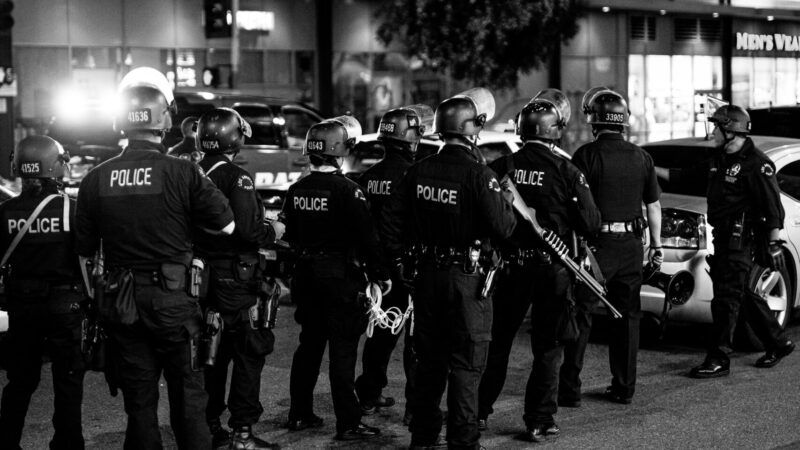Some States Are Finally Getting Serious About Addressing Police Misconduct
Reforms like the ones recently passed in Maryland and New Mexico offer a better long-term fix than the conviction of one police officer.

The nation has finally learned what it takes to remove a bad officer from a police force and provide some modicum of justice in a police-abuse case. We need only capture on video an officer slowly snuffing out a man's life, have that video go viral, endure some of the most far-reaching protests and riots in modern history and, then, after nearly a year of soul-searching and debate, wait for a jury to render a verdict.
Polls suggest that most Americans are relieved that the jury found former Minneapolis police officer Derek Chauvin guilty of all charges (second-degree unintentional murder, third-degree murder, and second-degree manslaughter) in the death of George Floyd. The causes of that incident, however, took place long before the awful scene we watched unfold last May.
"(A)nyone who looked closely at Chauvin's record would have known—should have known—that one day something bad was likely to happen while he was on the job," noted Jonathan Last in a column this week in The Bulwark. Chauvin "had 18 official complaints against him in his file—these are only the ones that citizens actually got up and followed through on registering."
In discussing police reform on social media and with friends, people often will say, "Police departments should just fire dirty cops." That's the right idea, of course, but legislatures and courts have created a multi-layered system that makes it nearly impossible to accomplish that seemingly simple task. Public-safety debates become emotional and divisive, so it becomes difficult to pass reforms that advance that common-sense outcome.
My conservative friends typically strike a "back the badge" attitude and see efforts to rein in the use of force as leftist attacks on law and order that will hobble the ability of officers to deal with criminals. I find that attitude unfathomable. Conservatives believe that government is abusive and oppressive, but the people who enforce these laws are heroes.
Their approach to police forces and police unions, which provide the main impediment to firing misbehaving cops by the way, reminds me of the situation with public schools. Everyone appreciates the hard work of teachers, but teachers' unions make it impossible (Google "Dance of the Lemons") to get rid of the losers. If you genuinely support teachers and police, you should support reforms that promote accountability and excellence.
My liberal friends are equally infuriating. They believe that officers often are abusive and oppressive, yet they continually support new laws and regulations that give officers more reason to intervene in people's lives. Many deadly police encounters start with the enforcement of some picayune regulation—such as when New York City police put Eric Garner in a chokehold ("I can't breathe") after detaining him for selling "loosies" (individual cigarettes).
California is the most progressive state, yet has the most regressive laws regarding police accountability, which is amazing given some of the racial inequities of this matter. Until recently, our state shielded records of police who had committed crimes or had faced disciplinary actions. We still don't have a decertification process, so fired officers just get jobs in other departments.
Our previous attorneys general—Xavier Becerra and Kamala Harris—served as tools of the powerful cop unions, who thwart reform. A 2019 paper from the University of Chicago found that "after sheriffs' deputies in Florida were allowed to unionize, violent incidents increased by 40 percent." It found a direct link between unionization and violent misconduct—not a surprise to those of us who have closely followed the issue.
At the state level, unions have secured the Peace Officers Bill of Rights. This "gives the government officials who enforce the laws significant protections not afforded other citizens, including time limits on any investigation knowledge of an investigation prior to an interrogation, access to evidence prior to interrogation and limitations on when they can be interrogated," the California Policy Center explains.
Police unions typically are the most powerful force at the local level, where they elect their lackeys—who then pass collective-bargaining agreements that ladle on additional protections. At the federal level, the courts created the doctrine of qualified immunity, which bars victims of police abuse (and abuse by any government officials) from suing an officer for violating their constitutional rights.
After Minneapolis, legislatures passed a variety of reforms, but many of them have been superficial. This month, however, the Maryland General Assembly overturned Gov. Larry Hogan's veto of a police-reform package that included a first-in-the-nation repeal of that noxious bill of rights. New Mexico Gov. Michelle Lujan Grisham this month signed a law overturning qualified immunity in that state.
Now we're finally getting somewhere. It shouldn't take an incident so egregious to prompt meaningful reforms, but the Maryland and New Mexico reforms offer a better long-term fix than the conviction of one police officer. Is there any chance the union-friendly California Legislature has the courage to follow suit?
This column was first published in The Orange County Register.
